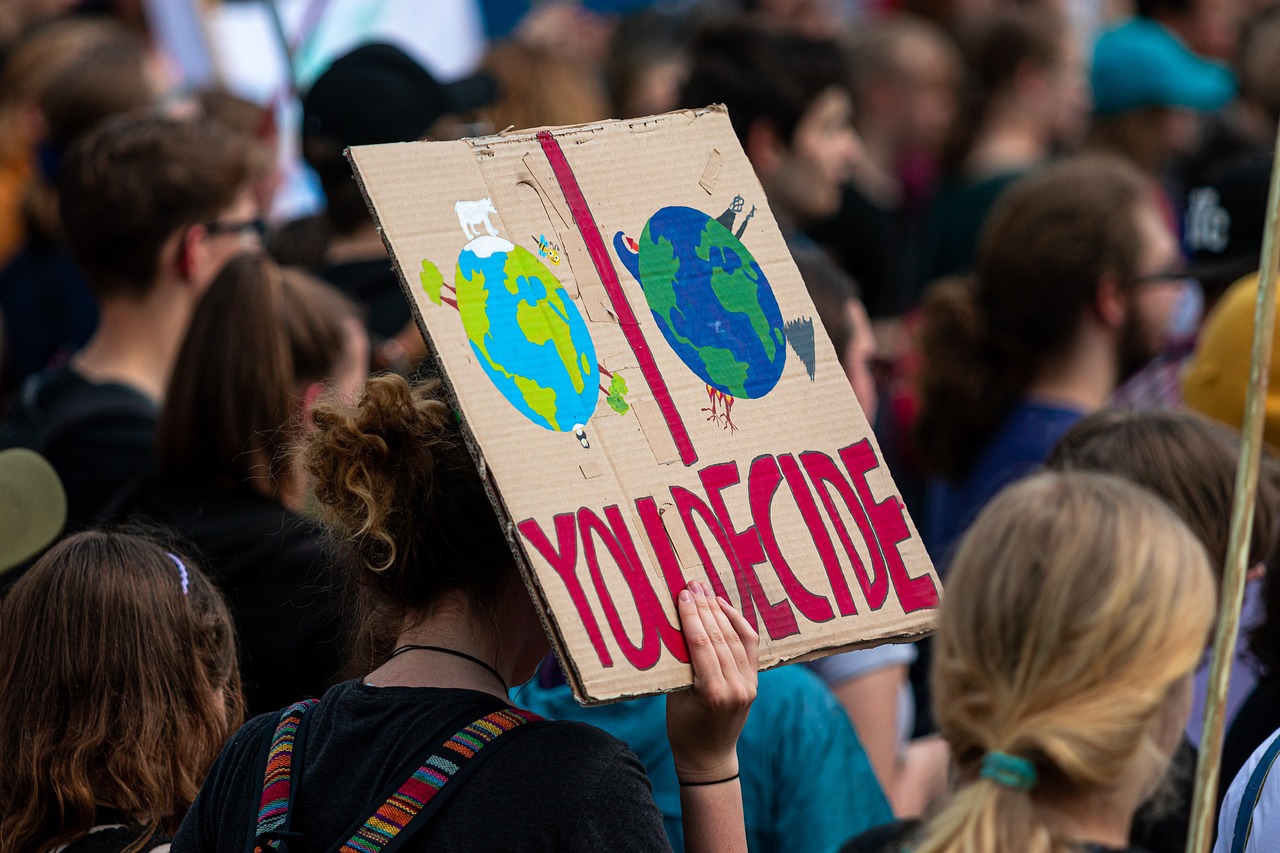To act or not to act. That`s the question
by Benedetta Fodaroni (2006) Liceo Sesto Properzio, Assisi/Italy on 2023-06-15

This article was written by Martina Polvere (2006) and Benedetta Fodaroni (2006), both from Liceo Properzio Assisi/Italy, based on the cooperation with Emilie Brunner (2005), Chiara Franke (2005) and Mia Haug (2005), students from Gisela-Gymnasium München/Germany during an online workshop in March 2023.
For the use of the photo we thank you at Pixabay.
TO ACT OR NOT TO ACT? THAT’S THE QUESTION
Certainly, in recent times, we have all been dealing with the subject of climate change and related issues. We have been talking about it for years now; at school, at work, on television, but has anything actually been done? Hope is the last to die, but slowly we are becoming convinced otherwise. If nothing can be changed, should we still engage with society? This is the question we asked our families and friends.
We got some encouraging messages from them, such as: “Of course we can change. Or rather, we can contribute to change by improving our lifestyle. How? By reducing pollution, the use of harsh detergents in our homes or the consumption of plastic, and by paying attention to waste separation.”
The current situation, however, is certainly not the best. In fact, we collected some testimonies that made us reflect. Some people believe that living in a small town one cannot complain too much, very often one is surrounded by greenery and consequently the air seems clean, but giving a concrete example, one family told us how a decade ago they lived in an area not far from where they live currently. A major problem was the presence of a distillery, which, with its foul smell, made the air in the entire village unbreathable and even short trips out had become intolerable. For many years, the village fought to close that factory and finally, after a long time, the protests were taken up. This, however, led to two contrasting situations, as on the one hand life changed drastically for the better, while on the other hand many jobs were lost. According to the ex-employees the solution could have been the optimisation of biodegradable substances, avoiding air pollution as much as possible: the elimination of pollution would never have been definitive, but even a decrease could have been beneficial for the environment.
Looking around we realise that, in general, protests are more than justified, but another consequence is that they sometimes end up damaging our cultural heritage and history. In fact, we see the emergence of new figures, those of activists, who increasingly attempt to campaign for the preservation of the planet, but do so in an extreme way. We see them perform acts of vandalism, such as damaging works of art, stopping traffic, blocking the departure of private vehicles in order to draw attention to their protest. We can mention an episode from a few days ago: in Rome some activists had decided to block the traffic in front of Rome-Fiumicino airport. All tied together like rings in a chain, they held signs in their hands with the words `We don`t pay for the fossil`. Theirs is one of the many protests, certainly for good, but that many people who risked losing their flight, certainly did not appreciate. In a short time, the authorities arrived, stopped the protest and restored traffic as soon as possible.
The question is: are they harming us or are we harming them and ourselves?
Perhaps their action will lose effectiveness and we will lose our world? Maybe so. After all, they want to send us a message and these are not demonstrative actions aimed at damaging a painting or a work of art.
Activists create discomfort as a tool with which to raise awareness and generate debate. These actions provoke mixed reactions, but they bring to the public`s attention a heartfelt issue of great interest: “Ours is not vandalism, but the cry of alarm of desperate citizens who do not resign themselves to the destruction of the Planet and, with it, of their lives”. This is how the movement justifies its choices.
Maybe we all think we are the future, the ones who will save the world, but how will we do this? And above all, will we make it?
Sources:
roma.repubblica.it
rainews.it
AGIRE O NON AGIRE? QUESTO E’ IL DILEMMA
Sicuramente in questi ultimi tempi, tutti abbiamo affrontato il tema del cambiamento climatico e delle problematiche ad esso connesse. Se ne parla ormai da anni; a scuola, al lavoro, in televisione, ma effettivamente, è stato fatto qualcosa? La speranza è l’ultima a morire, ma piano piano ci stiamo convincendo del contrario. Se non si può cambiare nulla dobbiamo ancora impegnarci nella società? Questa è la domanda che abbiamo posto alle nostre famiglie e ai nostri amici.
Ne abbiamo ricavato alcuni messaggi incoraggianti, come “Certo che possiamo cambiare. O meglio, possiamo contribuire al cambiamento, migliorando il nostro stile di vita. Come? Riducendo l’inquinamento, l’utilizzo di detersivi aggressivi in casa, il consumo della plastica e facendo attenzione alla raccolta differenziata.”
La situazione attuale non è sicuramente delle migliori. Abbiamo infatti raccolto alcune testimonianze che ci hanno fatto riflettere. Alcuni ritengono che abitando in un piccolo paese non ci si possa lamentare troppo. Molto spesso si è immersi nel verde e di conseguenza l’aria sembra pulita, ma, riportando un esempio concreto, una famiglia ci ha raccontato come una decina di anni fa risiedesse in una zona poco lontana dalla loro abitazione attuale. Un grave problema era rappresentato dalla presenza di una distilleria, che con il suo pessimo odore, rendeva l’aria di tutto il paese irrespirabile e anche solo brevi percorsi fuori casa erano diventati intollerabili. Per moltissimi anni il paese ha combattuto per far chiudere quella struttura e alla fine, dopo molto tempo, le richieste sono state accettate. Questo però ha portato a due situazioni contrastanti, poiché da una parte la vita è drasticamente cambiata in meglio, mentre dall’altra moltissimi posti di lavoro sono andati persi. Secondo gli ex dipendenti la soluzione avrebbe potuto essere l’ottimizzazione delle sostanze biodegradabili, evitando il più possibile l’inquinamento atmosferico: l’eliminazione dell’inquinamento non sarebbe mai stata definitiva, ma anche solo una diminuzione avrebbe potuto essere utile per l’ambiente.
Guardandoci intorno capiamo che, in generale, le proteste sono più che giuste, ma un’altra conseguenza è che, a volte, finiscono per danneggiare i nostri beni culturali e la nostra storia. Vediamo infatti nascere nuove figure, quelle degli attivisti, i quali sempre più spesso tentano di realizzare campagne per la salvaguardia del pianeta, ma lo fanno in modo estremo. Li vediamo compiere atti vandalici, come deturpare opere d’arte, fermare il traffico, bloccare la partenza di mezzi privati al fine di attirare l’attenzione sulla loro protesta. Possiamo citare un episodio di pochi giorni fa: a Roma alcuni attivisti hanno deciso di bloccare il traffico davanti all`aeroporto di Fiumicino. Tutti legati insieme come anelli di una catena, tenevano in mano dei cartelli con la scritta "Non paghiamo il fossile". La loro è una delle tante proteste, sicuramente a fin di bene, ma che molte persone che rischiavano di perdere il loro volo non hanno di certo apprezzato. In breve tempo sono subentrate le autorità che hanno fermato la protesta e ripristinato al più presto il traffico.
La domanda è: ci stanno danneggiando o siamo noi che stiamo danneggiando loro e noi stessi? Forse la loro azione perderà efficacia e noi perderemo il nostro mondo? Forse sì.
In fondo vogliono lanciare un messaggio e non si tratta di azioni dimostrative che hanno per finalità il danneggiamento di un quadro o di un’opera d’arte.
Gli attivisti creano un disagio come strumento con cui sensibilizzare e generare dibattito. Queste azioni suscitano reazioni contrastanti ma portano all’attenzione dell’opinione pubblica un tema sentito e di forte interesse: “Il nostro non è vandalismo, ma il grido di allarme di cittadini disperati che non si rassegnano ad andare incontro alla distruzione del Pianeta e, con esso, della propria vita”. Così il movimento motiva le proprie scelte.
Tutti noi pensiamo di essere il futuro, coloro che salveranno il mondo, ma come lo faremo? E soprattutto, ce la faremo?
Fonti:
roma.repubblica.it
rainews.it




